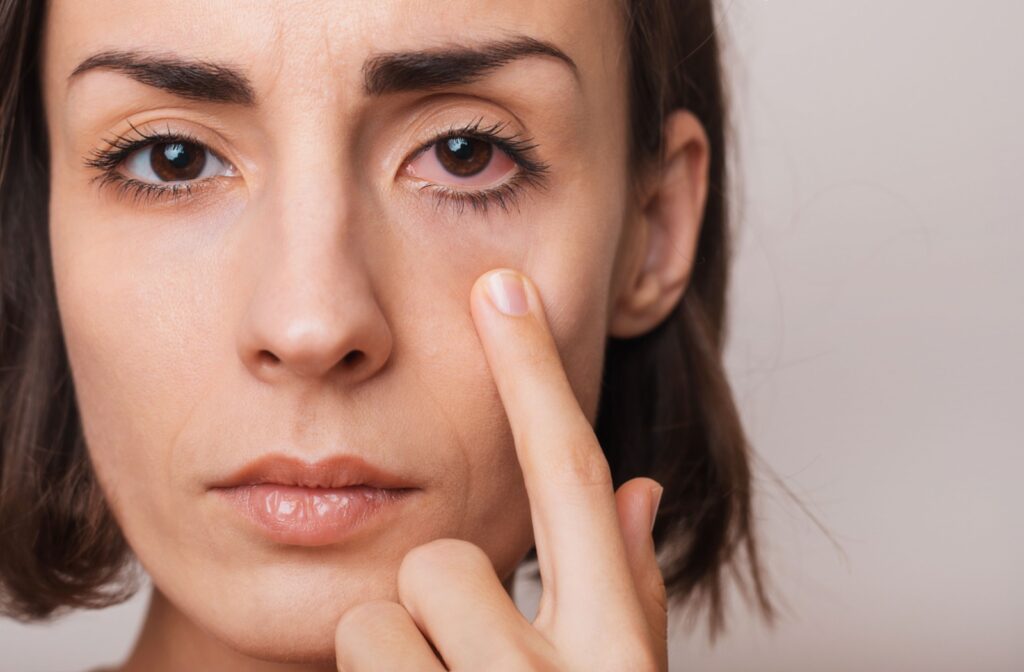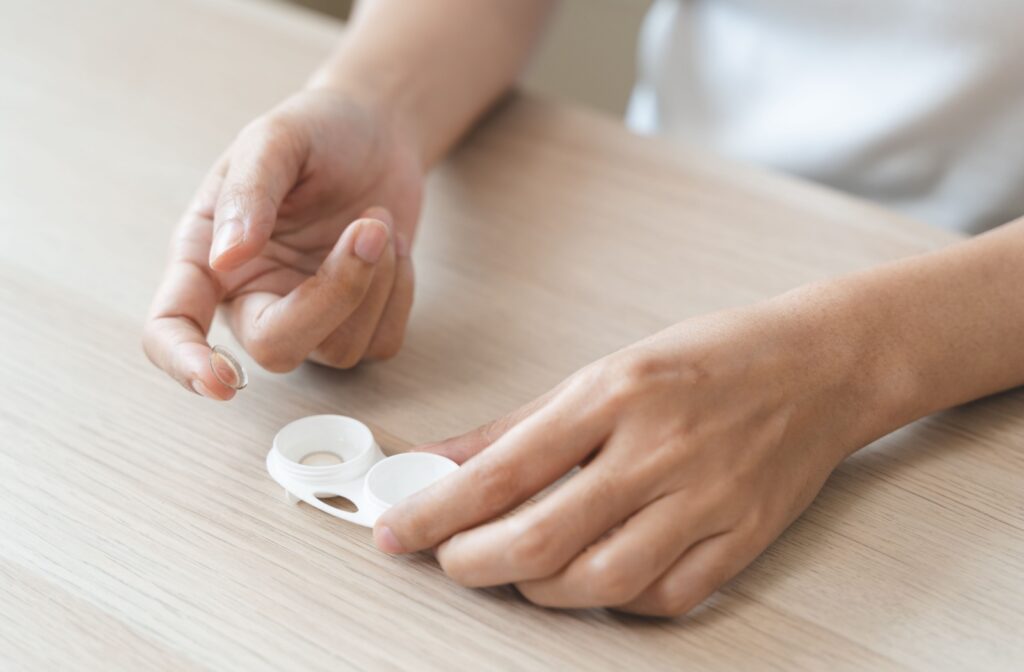Contact lenses offer convenience and clear vision, but only when used properly. If you’ve ever stretched your wear time or forgotten to swap out your lenses, you might be putting your eye health at risk without realizing it. Wearing contact lenses too long can reduce oxygen to the cornea, increase your risk of infection, and lead to long-term complications like corneal ulcers or neovascularization.
Even when lenses feel comfortable, pushing them past their recommended limits can cause damage that builds up over time. Whether you’re a seasoned wearer or new to contacts, it’s helpful to know what happens when lenses are overworn and how to prevent problems before they start.
What Does Overwearing Contacts Mean?
Wearing contact lenses longer than the recommended time (usually daily, extended, or monthly) is referred to as overwearing. This includes:
- Sleeping in your contacts (unless they are FDA-approved for overnight wear).
- Using daily-wear lenses beyond one day.
- Wearing monthly lenses longer than 30 days without proper cleaning and storage.
Though it might feel convenient to overwear lenses to avoid the hassle of replacement or cleaning, this is a risky habit that can harm your eyes.
Risks of Overwearing Contacts Lenses
Overwearing contacts can lead to a range of eye health problems. Here are some of the most common risks:
Lack of Oxygen Supply to the Cornea
Your cornea relies on oxygen to stay healthy. Contact lenses, though designed to allow oxygen through, still reduce your eye’s exposure to oxygen. If worn too long, lenses can contribute to oxygen deprivation:
- Your eyes may become red, irritated, or feel dry.
- Over time, this lack of oxygen can lead to a condition called corneal hypoxia, which can damage your cornea and potentially impact your vision.
Eye Infection
Improper lens hygiene combined with overwear creates the perfect breeding ground for bacteria and other harmful microorganisms. These germs can infect your eyes, leading to:
- Conjunctivitis (pink eye)
- Keratitis, an infection of the cornea
- Severe cases that, if untreated, may result in vision loss
Corneal Ulcers
Prolonged overwearing can cause microscopic breaks in your corneal surface, creating openings for bacteria to enter. This can lead to corneal ulcers, which require prompt medical treatment to avoid permanent scarring or vision problems.
Reduced Tear Film & Dry Eyes
Contact lenses absorb some of your eye’s natural moisture. If worn for too long, they can disrupt the tear film, leading to dry eyes. Symptoms may include:
- Burning or itching
- A feeling of something in your eye
- Temporary blurriness
Serious Long-Term Conditions
Chronic overwear habits can result in serious eye conditions like corneal neovascularization (when new blood vessels grow into the cornea in response to oxygen deprivation), which can permanently affect vision if left unchecked.

Proper Care & Tips for Contact Lenses
With proper care and wear schedules, you can help to avoid these risks. Here’s some tips on how:
Follow Recommended Wear Schedules
Always stick to the wear schedule provided by your optometrist or the lens manufacturer. For example:
- Daily lenses should be worn for one day only and disposed of immediately after.
- Monthly lenses should be replaced after 30 days, even if cleaned regularly.
Never Sleep in Your Contacts
Unless your lenses are specifically designed for overnight wear, remove them before bed. Sleeping in contacts significantly increases the likelihood of infections and other complications.
Keep Up With Lens Hygiene
Clean reusable lenses daily using the correct cleaning solution (not water!).
- Store lenses in a clean case, replacing the case every three months.
- Always wash and dry your hands before handling lenses.
Give Your Eyes a Rest
Even the most breathable contact lenses should not be worn 24/7. Give your eyes a break by switching to glasses when possible.
Schedule Regular Eye Exams
Visit your eye doctor regularly to monitor your eye health and ensure your contact lenses are still the best choice for your vision needs. A professional will also advise you on the newest advancements in lens technology.
The Importance of Regular Eye Exams
Frequent follow-ups with your optometrist play a role in your eyes staying healthy. At Total Vision Campbell, we’re dedicated to helping you manage your contact lens care:
- Comprehensive eye exams: We assess your overall eye health and ensure your contacts fit perfectly.
- Lens consultations: From choosing the right type to scheduling reminders for replacements, we’re here to help.
- Emergency care: Experiencing discomfort or redness? Don’t wait. Reach out for immediate help.
Your optometrist is your first line of defense when it comes to preventing and managing contact lens risks. Schedule your next visit today to help stay ahead of potential problems.
Get Expert Help to Keep Your Eyes Healthy
Wearing contact lenses should enhance your vision, not jeopardize your eye health. Though overwearing contacts might seem harmless in the short term, the risks it poses aren’t worth it. To keep your eyes healthy:
- Follow your optometrist’s guidelines.
- Stick to your wear schedule.
- Regularly clean and replace your lenses.
- Book routine eye exams with trusted professionals.
At Total Vision Campbell, we’re committed to keeping your eyes healthy and clear. If you’re experiencing any discomfort or you need a contact lens consultation, book an appointment with our team today.



